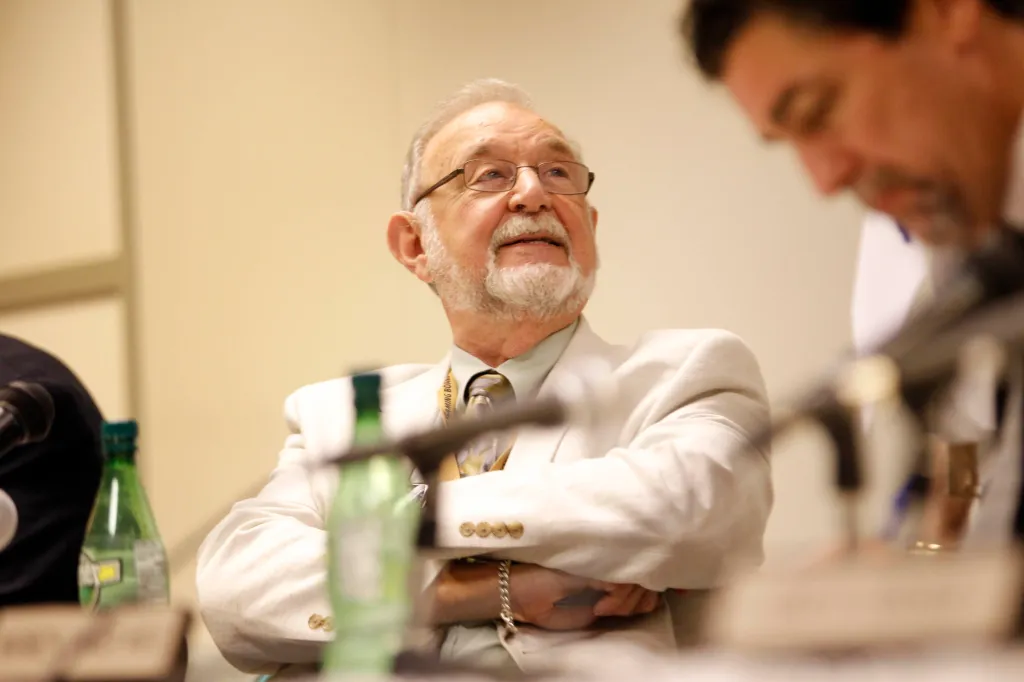
Aaron Jaffe represented the northern suburbs in the state House for 14 years before serving as a Cook County judge for nearly two decades and a decade more as chair of the Illinois Gaming Board.
Jaffe’s role overseeing the state’s gambling control board involved overseeing legal riverboat casinos and video gaming terminals.
“He was an excellent chairman of a very important board, to make sure that we had honesty and integrity when it comes to gambling in Illinois,” said former Gov. Pat Quinn, who reappointed Jaffe as the board’s chair. “He was an exemplary legislator, judge and regulator and he just did everything with great integrity, and I think everyone in Illinois owes a permanent debt of gratitude to his public service.”
Jaffe, 95, died of complications from pneumonia on Sept. 10 at the Alden Estates of Evanston rehabilitation center, said his wife of 74 years, Charlotte. He had been an Evanston resident since 1985 and previously lived in Skokie for 26 years.
Born in Chicago, Jaffe grew up on the West Side and graduated from Marshall High School. He started college at the University of Illinois Urbana-Champaign but then moved to California with his parents, transferring first to Los Angeles City College and then to the University of California, Los Angeles.
After college, Jaffe earned a law degree from DePaul University in 1953. He then practiced general law with a partner, future federal magistrate judge Martin Ashman, based in downtown Chicago. Interested in Democratic politics, Jaffe eventually became the Democratic Party village chairman for Skokie, and in 1969, he was elected Niles Township Democratic committeeman.
In 1970, Jaffe was elected state representative in the state’s 4th District. In his early years as a lawmaker, he pushed hard to create the Regional Transportation Authority, arguing the RTA could expand and improve mass transportation between suburbs.
“The energy crisis demands an RTA,” he told the Tribune’s David Gilbert in 1974. “And with the tremendous growth of business and industry in suburban areas, northeastern Illinois must have a coordinated transit system if that area is to survive.”
Jaffe established a reputation in Springfield as an independent Democrat harboring progressive views, particularly on social issues and civil liberties. He sponsored legislation in the area of child abuse and helped rewrite Illinois rape laws, along with chairing the state’s Rape Study Committee. He also was a longstanding opponent of township government.
“He was so authentic and real — he was who he was, and he believed in what he believed in, and his word was his bond,” said former state Sen. William Marovitz, who served in the state House with Jaffe in the 1970s. “He was the leader of the liberals in the House and when he stood to talk, people listened because he always was thoughtful in his remarks. I never heard him degrade anybody, and I never heard him swear or be angry at anybody. He was a man of great decency and compassion and just one of a kind. They don’t make them like that anymore.”
Attorney David Epstein, the former state House parliamentarian, recalled Jaffe as “a guy who got things done.”
“You make friends and enemies when you serve that long, and nobody disliked Aaron,” Epstein said. “He was an effective guy who was always 100% honest and made very clear what he was trying to accomplish and what he opposed. So even people who strongly disagreed with him would listen to him.”
In 1982, after Jaffe had been remapped into the 56th District, which was only 48% Democratic, he won reelection with 68% of the vote, defeating Republican challenger Thomas Rueckert.
Shortly after winning reelection to his eighth term in 1984, Jaffe was appointed a Cook County Circuit Court judge by the state Supreme Court. The appointment became effective in January 1985, and Jaffe resigned from the state House.
“It’s never been a secret I wanted a judgeship,” Jaffe told the Tribune. “I knew I was being considered, but I had no knowledge of what vacancy would or wouldn’t open up.”
Jaffe’s wife called him “a hard-working legislator” who was “burned out” after 14 years in Springfield.
Jaffe began his judicial career in the domestic relations division. He shifted in 1991 to the law division, his wife said, after developing a “bleeding ulcer from having to make decisions about where to place children.” He served in the law division until 1993, when he transferred to the chancery division.
In a 1999 ruling involving a Country Club Hills resident suing to oust a local alderman convicted of armed robbery as a teenager, Jaffe ruled that a 1993 state law barring convicted felons from holding municipal office was unconstitutional.
In 2004, Jaffe retired as a judge. A year later, then-Gov. Rod Blagojevich appointed Jaffe to chair the revamped Illinois Gaming Board. The move followed years of criticism the board was not a tough enough regulator of the gambling industry. That included awarding a license to a company that had planned to open in Rosemont, whose longtime mayor, Donald Stephens, was linked to organized crime, an accusation Stephens and village officials denied. Blagojevich’s appointment of Jaffe also came after the governor had been criticized for meddling in the board’s affairs, even though the agency is supposed to be independent.
Jaffe said in 2005 that he was buoyed by Blagojevich’s claims he would not interfere with the board.
“He told me that I would have a free hand to do what I wish with the support of the board,” Jaffe told the Tribune upon his appointment. “We can’t afford the hands of government to be monkeying with this.”
While working to keep the board independent from the governor and lawmakers, Jaffe was also chair when the board took the state’s 10th casino license from the Emerald Casino company that wanted to open in Rosemont despite the mob allegations. In 2008, the board awarded the license to a company that ultimately built a casino in Des Plaines.
In 2009, state lawmakers permitted video poker machines in towns that allowed them as a means to generate funds for capital projects throughout the state. The machines finally went live in 2012, partly due to the Gaming Board’s small staff needing to take a long time to review all the applications of manufacturers, distributors and restaurants and taverns that wanted video poker machines.
“This is an entirely new industry,” Jaffe told the Tribune in 2012. “When you think of giving out tens of thousands of licenses…and that we have to do investigations that would boggle your mind, that takes a great deal of time.”
Jaffe remained an outspoken opponent of bills in Springfield that called for expanding casinos, saying the legislation lacked ethical safeguards. He left the board in 2015 after then-Gov. Bruce Rauner chose not to reappoint him. During his retirement, he and his wife traveled and spent time with family.
“He enjoyed being with his children and grandchildren, and he was able to spend more time with them,” Charlotte Jaffe said. “We did a lot of things that we put off because of all the time that he spent working.”
Jaffe is survived by two sons, Alan and Lowell; a daughter, Alisa; six grandchildren; and two great-grandchildren.
A private service is being held, and a public celebration of life reception is scheduled for Sunday, Oct. 12.
Bob Goldsborough is a freelance reporter.



